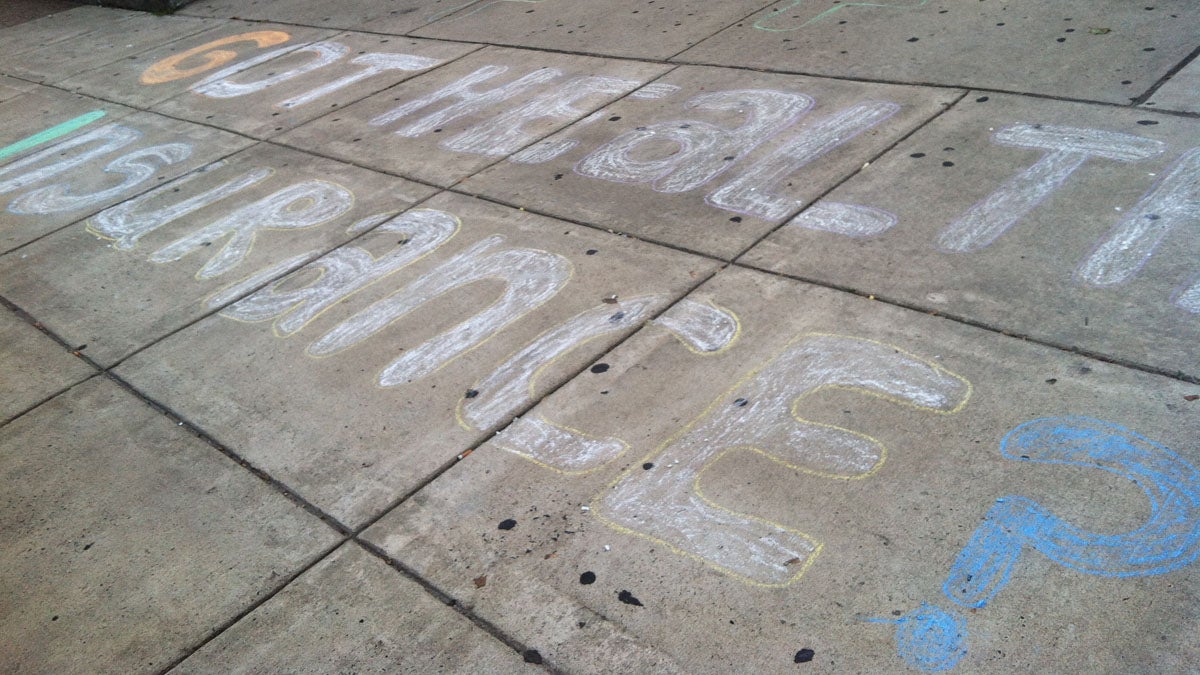The Obamacare rollout: Scenes from a very bumpy ride
Listen
Sidewalk art outside a community center in South Philadelphia in September aims to draw residents in to a town hall about the new health care marketplaces. (Elana Gordon/for The Pulse)
The Pulse’s Elana Gordon sat next to some local folks as they tried to sign up for health insurance through HealthCare.gov. It wasn’t pretty.
The federal health law has taken center stage in recent months, with the rocky rollout of the new online marketplaces for health insurance becoming the target of congressional hearings and comedy shows alike.
But for people like Suzanne Cloud, Nathaniel Scott and Danielle Gatto, the marketplace launch has brought a mix of hope and confusion.
The new insurance coverage is slated to kick in as early as New Year’s Day for people who sign up by Dec. 23. Coverage, for the most part, is intended for people who don’t get health insurance through work.
For many, such insurance had previously been too expensive or unattainable, with pre-existing health conditions barring their way.
The new options, found through the online health care marketplaces set up by the Affordable Care Act, could affect upwards of a million people in Pennsylvania, Delaware and New Jersey combined.
In all three states, the federal government is taking the lead on running the exchanges, as each state each declined to set up its own exchange. The glitches plaguing the federal site, HealthCare.gov, have been well documented. Over Thanksgiving weekend, federal officials claimed they worked out some of the earlier problems of the website, which now allows consumers to window shop.
Making the head spin
Danielle Gatto, a 33-year-old restaurant manager in South Philadelphia, has good reason to check out the exchange. Her insurer is discontinuing her current coverage come June because it doesn’t meet new standards under the law.
Gatto doesn’t love her coverage; it doesn’t cover her treatment for Crohn’s disease. But she’s stressed out trying find an affordable plan which would work for her, among the dozens of options available.
“It just sort of made my head spin to try to figure out these numbers and make them fit my actual life,” said Gatto, adding that she has yet to identify a plan which would cover her medicine.
An ominous sound
Suzanne Cloud, a 62-year-old from Collingswood, on the other hand, was eager to sign up.
“I’m really anxious to see what benefits packages there are out there for what I need, for typical chronic conditions that a person my age would have,” said Cloud, a jazz musician who, ironically, runs a nonprofit that helps connect fellow musicians with benefits like health care.
Cloud has diabetes and high blood pressure. She isn’t old enough for Medicare, so she decided to check out healthcare.gov.
She’s optimistic, but from the onset has encountered technical and administrative hold-ups in each step of the sign-up process. She’s had to recreate her account after previous ones went missing.
On the first try, she said, “I got through that and it kind of went zip and went to a page with all kinds of HTML stuff.”
Willing, but unable
Nathaniel Scott, 24, of South Philly has also logged into the portal, hoping it would lead to health coverage. Scott, who does contract work in IT and has been seeking full-time employment, is exactly the kind of guy insurers want to enroll: young and healthy. And unlike many so-called “young invincibles,” he wants coverage.
“My biggest concern is that one day I go through a medical emergency and I require a visit to a hospital,” said Scott. “And then after I get out I get a bill from the hospital for thousands and thousands of dollars, and then my head’s spinning, thinking ‘oh my goodness, how am I going to pay for all of this?!”
Scott, like Cloud, wasn’t able to get past creating an account and into the section outlining his options. The two, as it turned out, were among thousands of Americans for whom healthcare.gov was an early bust.
Health and Human Services Secretary Kathleen Sebelius has acknowledged the website woes, apologizing during a recent congressional hearing.
During the first month, she reported, about 55,000 people in Delaware, New Jersey and Pennsylvania were able to use the site to create applications. And creating the application is just the first step
Stubborn for success
Janice Baker, a 59-year-old resident of Delaware, was one of the reported 100 or so in the state who actually made it the whole way through during that first month, signing up with an insurer. She says it was a two-week effort.
“If I wasn’t so hard-headed, I don’t think I could have gotten it done,” said Baker.
The launch hasn’t been a universal disaster. Some states running their own marketplaces have had more success. In New York, more than 70,000 people have been able to enroll. Federal officials now say healthcare.gov is working a lot better.
As for Scott and Cloud, they’re hopeful about gaining coverage. But two months in, both have yet to enroll. Cloud is awaiting word whether she might now qualify for New Jersey’s expanded Medicaid program, while Scott is still seeking answers to why his application won’t go through.
Here are some some tips on how to navigate the exchanges.
Have you given healthcare.gov a chance? If so, let us know how the experience went at thepulse@whyy.org.
Disclosure: Independence Blue Cross is a sponsoring underwriter for The Pulse.
WHYY is your source for fact-based, in-depth journalism and information. As a nonprofit organization, we rely on financial support from readers like you. Please give today.



